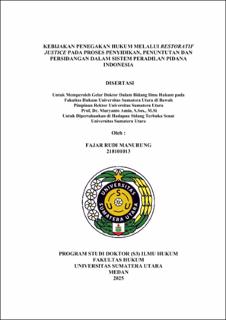| dc.description.abstract | Law enforcement against certain criminal acts is sometimes condemned by the public and has injured the sense of justice, stating that the law is sharp to the weak but blunt to the powerful. In the practice of law enforcement, the police, prosecutors, and judges, if at least 2 pieces of evidence support the crime and meet the formal and material requirements, will conduct an investigation, prosecution, and trial according to the Indonesian criminal justice system (SPPI) based on the Criminal Procedure Code (KUHAP) (retributive theory). Termination of criminal cases can only be done if there are reasons for insufficient evidence, it is not a criminal offense, or it is stopped by law. However, to meet legal developments and the purposes of law regarding justice, utility, and legal certainty, as well as to fill legal voids and the shift of the paradigm of sentencing from retributive to restorative justice, guidelines for the termination of certain criminal cases are needed. Thus, the Regulation of the National Police of the Republic of Indonesia Number 8 of 2021 concerning the Handling of Criminal Acts Based on Restorative Justice, the Regulation of the Attorney General of the Republic of Indonesia Number 15 of 2020 concerning the Termination of Prosecution Based on Restorative Justice, and the Regulation of the Supreme Court of the Republic of Indonesia Number 1 of 2024 concerning Guidelines for Adjudicating Criminal Cases Based on Restorative Justice were issued. The implementation of restorative justice in its execution raises issues about how the termination of criminal cases based on restorative justice compares to what is stipulated in the Criminal Procedure Code, why internal regulations can serve as a basis for the termination of criminal cases, and how the concept of termination of criminal cases based on restorative justice operates both outside and inside the court. The research is conducted through normative law, based on secondary data obtained through document studies such as primary, secondary, and tertiary legal materials, as well as through field studies. In conclusion, terminating criminal cases based on restorative justice is essential; there must be uniformity (harmonization) regarding the provisions and requirements of restorative justice at the stages of investigation, prosecution, and trial. Termination of criminal cases based on restorative justice should be included in criminal procedural law regarding the cessation of criminal cases outside of court (non-penal) and in court (penal) to provide legality and appoint an independent team as mediators in achieving reconciliation between victims and offenders. | en_US |


